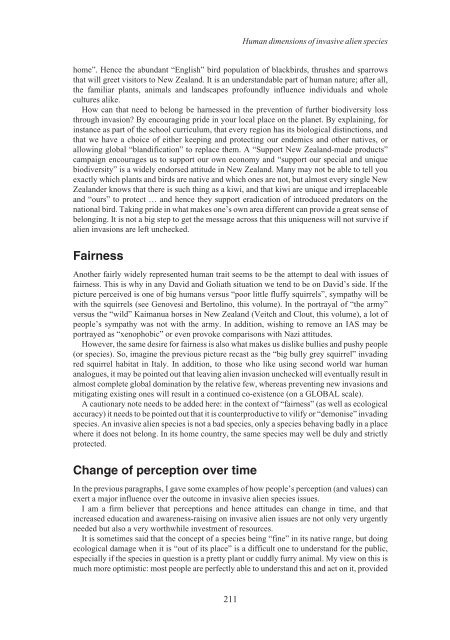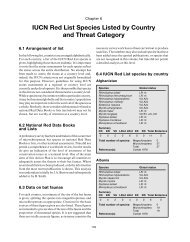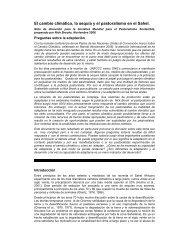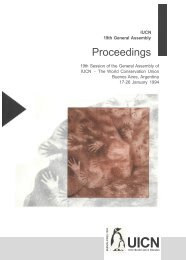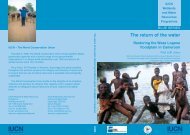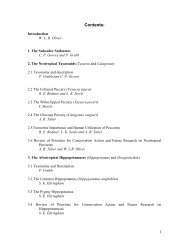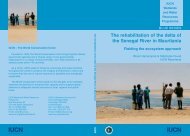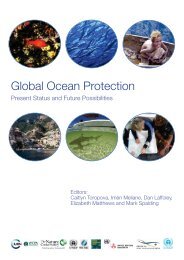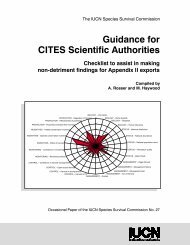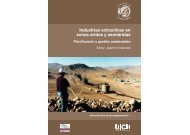Alien Species.vp - IUCN
Alien Species.vp - IUCN
Alien Species.vp - IUCN
Create successful ePaper yourself
Turn your PDF publications into a flip-book with our unique Google optimized e-Paper software.
home”. Hence the abundant “English” bird population of blackbirds, thrushes and sparrows<br />
that will greet visitors to New Zealand. It is an understandable part of human nature; after all,<br />
the familiar plants, animals and landscapes profoundly influence individuals and whole<br />
cultures alike.<br />
How can that need to belong be harnessed in the prevention of further biodiversity loss<br />
through invasion? By encouraging pride in your local place on the planet. By explaining, for<br />
instance as part of the school curriculum, that every region has its biological distinctions, and<br />
that we have a choice of either keeping and protecting our endemics and other natives, or<br />
allowing global “blandification” to replace them. A “Support New Zealand-made products”<br />
campaign encourages us to support our own economy and “support our special and unique<br />
biodiversity” is a widely endorsed attitude in New Zealand. Many may not be able to tell you<br />
exactly which plants and birds are native and which ones are not, but almost every single New<br />
Zealander knows that there is such thing as a kiwi, and that kiwi are unique and irreplaceable<br />
and “ours” to protect … and hence they support eradication of introduced predators on the<br />
national bird. Taking pride in what makes one’s own area different can provide a great sense of<br />
belonging. It is not a big step to get the message across that this uniqueness will not survive if<br />
alien invasions are left unchecked.<br />
Fairness<br />
Another fairly widely represented human trait seems to be the attempt to deal with issues of<br />
fairness. This is why in any David and Goliath situation we tend to be on David’s side. If the<br />
picture perceived is one of big humans versus “poor little fluffy squirrels”, sympathy will be<br />
with the squirrels (see Genovesi and Bertolino, this volume). In the portrayal of “the army”<br />
versus the “wild” Kaimanua horses in New Zealand (Veitch and Clout, this volume), a lot of<br />
people’s sympathy was not with the army. In addition, wishing to remove an IAS may be<br />
portrayed as “xenophobic” or even provoke comparisons with Nazi attitudes.<br />
However, the same desire for fairness is also what makes us dislike bullies and pushy people<br />
(or species). So, imagine the previous picture recast as the “big bully grey squirrel” invading<br />
red squirrel habitat in Italy. In addition, to those who like using second world war human<br />
analogues, it may be pointed out that leaving alien invasion unchecked will eventually result in<br />
almost complete global domination by the relative few, whereas preventing new invasions and<br />
mitigating existing ones will result in a continued co-existence (on a GLOBAL scale).<br />
A cautionary note needs to be added here: in the context of “fairness” (as well as ecological<br />
accuracy) it needs to be pointed out that it is counterproductive to vilify or “demonise” invading<br />
species. An invasive alien species is not a bad species, only a species behaving badly in a place<br />
where it does not belong. In its home country, the same species may well be duly and strictly<br />
protected.<br />
Change of perception over time<br />
In the previous paragraphs, I gave some examples of how people’s perception (and values) can<br />
exert a major influence over the outcome in invasive alien species issues.<br />
I am a firm believer that perceptions and hence attitudes can change in time, and that<br />
increased education and awareness-raising on invasive alien issues are not only very urgently<br />
needed but also a very worthwhile investment of resources.<br />
It is sometimes said that the concept of a species being “fine” in its native range, but doing<br />
ecological damage when it is “out of its place” is a difficult one to understand for the public,<br />
especially if the species in question is a pretty plant or cuddly furry animal. My view on this is<br />
much more optimistic: most people are perfectly able to understand this and act on it, provided<br />
211<br />
Human dimensions of invasive alien species


